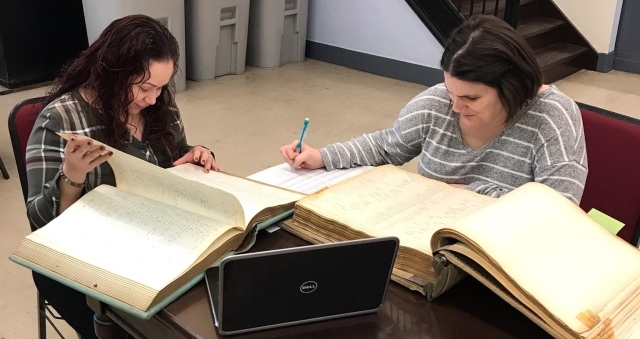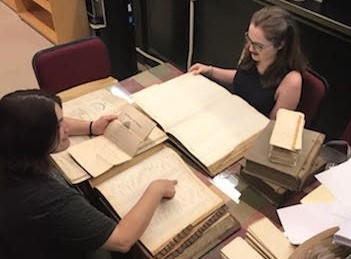
Many people now pay for genealogical services to track their ancestry and family roots. What if that information were free and publicly available online?
Students in the dual Master of Arts (M.A.) Public History / Master of Science (M.S.) Library and Information Science program have been using their extensive archival skills and knowledge to make that possible. As interns at the Queen’s County Clerk’s Office, Jeanette Lazo ‘11C, Ryan McDonnell, and Reba Weatherford have been working on a grant-supported initiative to digitize and make available freely online more than 400,000 naturalization records from the borough. The records cover a period spanning from 1794 to 1952 and include Declarations of Intent, Petitions for Naturalization, and other records useful for genealogical and historical research.
The Queens and Bronx County Clerk’s Offices are the recipients of National Historical Publications and Records Commission funding through the United States National Archives and Records Administration (NARA), an agency that provides public access to federal government records, allowing citizens to better understand U.S. history and democratic processes. The grant of $263,575 supports a three-year project that began February 2020 and that will make the two boroughs the first in the nation to offer their naturalization records to the public online.
The St. John’s students are directly involved with every aspect of the project, including preparing and organizing the naturalization records, creating metadata for the records, and engaging in public outreach.
“St. John’s Library and Information Science and Public History graduate students have been actively assisting with meticulously inventorying many of these older records in preparation for the digitization process,” said Raymond Weaver, Records Management Officer for the Queens County Clerk’s Office. “Their work will save us countless hours when we send these records to a vendor to be imaged.”

“Working with the naturalization records has opened my eyes to the challenges of archival projects,” said Jeanette. “As we move forward in the digital age, how do we make sure data remains protected and accessible? It’s a big responsibility to protect archives and ensure their longevity so that history keeps moving forward.”
Jeanette and Reba are inventorying the records and building a database in Microsoft Access to house the archival information, as well as compiling materials in both English and Spanish for public outreach. Ryan is using information from the records to research the U.S. naturalization process and its changes over time.
“I have been researching how other scholars have used naturalization records to create a timeline of key events in naturalization history.,” he said. “The records are necessary to trace the evolution of naturalization processes and understand U.S. immigration policy towards certain ethnic groups over time.”
Along with another dual degree student, Luke Henke, Ryan is also the recipient of the 2020-2021 Citi Center for Culture + Queens Library Fellowship. Fellows receive $1,000 in scholarship funds and diversify their exposure to collection management and use of archival collections through two semester-long rotations at the Citi Center for Culture and the Archives at Queens Library. Luke and Ryan will gain meaningful first-hand experience in corporate and public library archives settings.
As part of the dual master’s degree in Public History and Library and Information at St. John’s, students typically complete nine credit hours of internship, allowing them to gain valuable hands-on experience with handling and digitizing archived materials in order to make them accessible. For Jeanette, Reba, and Ryan, that internship experience will also lead to community resources that help people learn about their family histories and tell their stories.
“Sometimes how we tell a story and who we tell it to is as important as what happened,” said Reba.
Related News
Q&A with Brenda Almendarez-De Bello ’06M.S.Ed., ’19Ed.D., LEAD Honoree
Brenda Almendarez-De Bello ’06M.S.Ed., ’19Ed.D., Principal of Tamarac Elementary School in the Sachem Central School District , will be among several alumni honored by The School of Education (SOE) at...
SOE Alumnus Honored by SAANYS
John Trotta ’26Ed.D., Assistant Principal at Polk Street Elementary School in the Franklin Square, NY, School District, was recently named 2026 New York State Elementary School Assistant Principal of...
The School of Education Celebrates Catholic Schools Week with Special Gift to Our Lady of Victory School
In celebration of Catholic Schools Week, The School of Education at St. John’s University donated 14 digital microscopes to Our Lady of Victory School in Mount Vernon, NY. Robert DiNardo, Director of...
